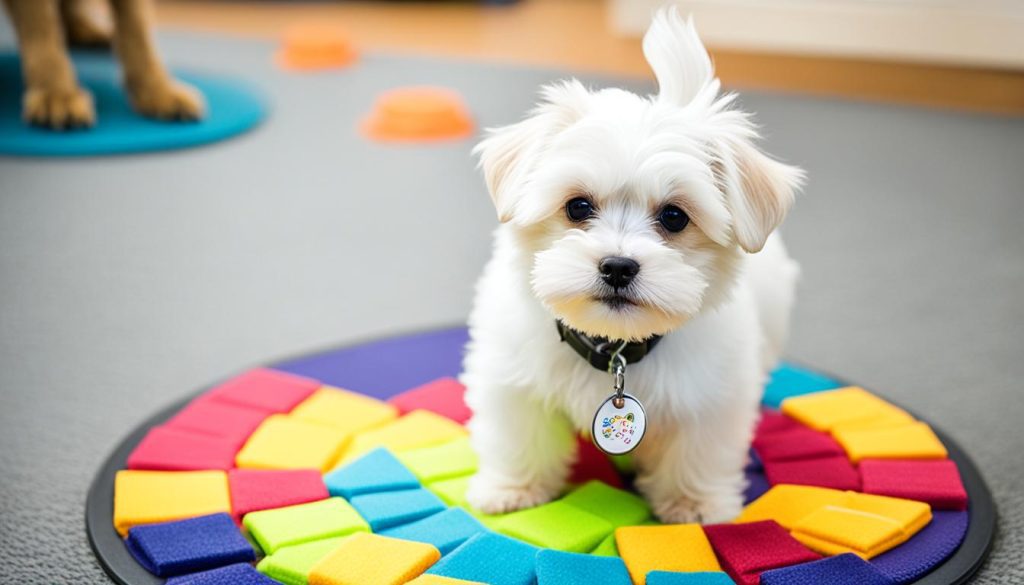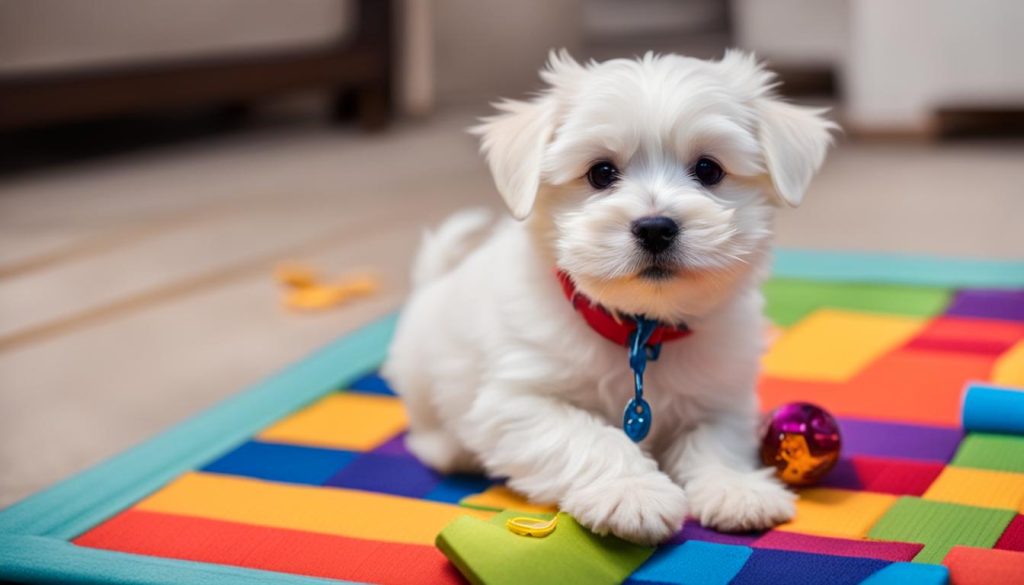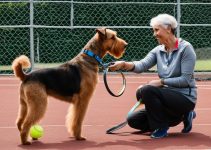Training Maltese dogs can be both a delightful and challenging experience. These adorable and intelligent pups require early guidance and consistent training to establish good behavior. In this article, I will share valuable tips on Maltese training, including effective techniques, essential commands, and helpful strategies to ensure you have a happy and obedient Maltese companion.
When it comes to Maltese training, starting early is essential. By introducing basic obedience commands from an early age, you lay the foundation for your Maltese’s behavior and create a harmonious relationship between you and your furry friend.
Discover Maltese Training
- Start training your Maltese puppy as early as possible to establish boundaries and expectations.
- Consistency is key in Maltese training; use the same commands and rewards across all family members.
- Positive reinforcement is a powerful tool; reward good behavior with praise, treats, or playtime.
- Keep training sessions short and engaging to accommodate your Maltese puppy’s short attention span.
- Use clear and simple commands to ensure understanding and avoid confusion.
Start Your Maltese Puppy Early
When it comes to training your Maltese puppy, starting early is key to building a foundation of good behavior. By teaching them basic obedience commands from the beginning, such as “sit,” “stay,” and “come,” you can establish boundaries and expectations.
Early training sets the stage for your puppy to develop good behavior as they grow. It helps them understand what is expected of them and creates a harmonious environment for both you and your furry friend. By investing time and effort into training your Maltese puppy early on, you’ll lay the groundwork for a well-behaved and happy dog.
Consistency is Key with a Maltese Puppy
Consistency plays a vital role in the successful training of your Maltese puppy. By ensuring that everyone in your household uses the same commands and rewards, you create a clear and cohesive training approach. This consistency helps your puppy understand the desired behavior and avoids confusion.
When it comes to training your Maltese, using the same commands and rewards across the board establishes a common language between you and your pup. This uniformity allows your puppy to develop a consistent understanding of what you expect from them.
For example, if one family member uses the command “sit” while another says “down,” it can be confusing for your Maltese and hinder their progress. Instead, choose a set of simple and clear commands that are easy for your puppy to understand and remember.
Consistency also extends to the rewards you give your Maltese for good behavior. Whether you use treats, verbal praise, or playtime as rewards, make sure everyone in your household follows the same approach. This consistency reinforces the positive behavior and motivates your puppy to repeat it in the future.
By maintaining consistency in your training approach, schedule, and expectations, you create a solid foundation for your Maltese puppy. This consistency helps them understand what is expected of them and fosters a positive learning environment. Remember, a well-trained Maltese is a happy and well-adjusted companion.
Benefits of Consistency in Maltese Puppy Training
- Clear expectations: Consistency allows your puppy to understand the desired behavior and what you expect from them.
- Reduced confusion: Using the same commands and rewards eliminates confusion and helps your puppy learn more effectively.
- Established communication: Consistent training creates a common language between you and your Maltese, making it easier to communicate and build a stronger bond.
- Improved retention: By consistently reinforcing desired behavior, your puppy is more likely to remember and repeat it.
Training a Maltese puppy requires patience and dedication, but consistency is a crucial factor in their overall success. When everyone in your household follows the same commands and rewards, you create a harmonious training environment that promotes effective learning and behavior development.

Positive Reinforcement in Maltese Training
Positive reinforcement is a powerful tool when it comes to training your Maltese puppy. By rewarding good behavior, you can effectively communicate your expectations and encourage your pup to continue exhibiting the desired actions. The key to positive reinforcement is to use rewards that your Maltese finds motivating.
One way to reward your Maltese for good behavior is through praise and affection. When your pup follows a command or behaves appropriately, shower them with verbal praise and gentle petting. This shows them that they are doing something right and that you are pleased with their actions.
Treats also work wonders as rewards during training sessions. Choose small, bite-sized treats that are tasty and enticing to your Maltese. Whenever they perform a desired behavior, immediately provide them with a treat. This reinforces the connection between the action and the positive outcome, making your Maltese more likely to repeat the behavior in the future.
In addition to praise and treats, you can also reward your Maltese with playtime. After a successful training session or when they demonstrate good behavior, engage in a fun game or play with their favorite toy. This not only reinforces positive behavior but also helps strengthen the bond between you and your furry friend.
Remember, consistency is key when using positive reinforcement. Be sure to reward your Maltese promptly and consistently when they exhibit the desired behavior. This helps them understand what actions are desirable and encourages them to continue behaving well.
Benefits of Positive Reinforcement:
- Creates a positive learning environment for your Maltese
- Strengthens the bond between you and your pup
- Increases your Maltese’s motivation to learn and obey commands
- Builds confidence and trust in your Maltese
- Helps prevent and address behavioral issues
By utilizing positive reinforcement techniques, you can effectively train your Maltese puppy while maintaining a happy and enjoyable training experience for both of you.
Keep Training Sessions Short and Sweet
When it comes to Maltese training, it’s important to keep the sessions short and engaging. Puppies have short attention spans, and long training sessions can lead to boredom and frustration. By keeping the sessions brief, you can ensure that your Maltese stays focused and retains information better.
I recommend aiming for 10-15 minute training sessions, 2-3 times a day. This allows your puppy to have multiple opportunities to learn and practice new skills without overwhelming them. Remember, quality over quantity is the key to successful training sessions.
During each session, focus on one or two specific commands or behaviors. This targeted approach helps prevent your Maltese from feeling overwhelmed and ensures that they master each skill before moving on to the next. Gradually increase the difficulty of the training as your Maltese becomes more proficient.
Make sure to incorporate plenty of positive reinforcement during the training sessions. Praise your Maltese enthusiastically when they perform the desired behavior correctly. You can also use small treats as rewards to motivate and reinforce good behavior. This positive and rewarding experience will make your Maltese eager to participate in future training sessions.
Tips for Successful Training Sessions:
- Choose a quiet and distraction-free environment for training.
- Use clear and consistent commands.
- Break down complex behaviors into smaller steps.
- Maintain a calm and patient demeanor throughout the session.
- End each session on a positive note, even if there were some challenges along the way.

By following these training tips and keeping sessions short and sweet, you can ensure that your Maltese enjoys the training process and makes steady progress. Remember, consistency and positive reinforcement are key. Happy training!
Use Clear, Simple Commands with Your Maltese
When it comes to maltese obedience training, using clear and simple commands is essential for effective communication with your furry friend. By using commands that are easy for your Maltese to understand, you can prevent confusion and help them grasp what you expect from them. One-word commands work best, as they are concise and straightforward.
For example, commands like “sit,” “stay,” “down,” and “come” are ideal for training your Maltese. These commands are easy for dogs to recognize and remember, making the training process smoother and more efficient. Avoid using long phrases or multiple words for the same command, as this can overwhelm your Maltese and make it harder for them to respond appropriately.
Using clear commands also helps create consistency in your training sessions. When your Maltese understands what you want them to do, they are more likely to exhibit the desired behavior consistently. Remember to use a firm yet gentle tone when giving commands, and reinforce them with positive reinforcement such as treats or praise.
Conclusion
Training your Maltese requires patience, consistency, and an understanding of their unique personality traits. By following these Maltese training tips, you can ensure that your furry friend becomes a well-behaved and happy member of your family.
Positive reinforcement techniques play a crucial role in Maltese training. Reward your pup with praise, treats, or playtime when they exhibit the desired behavior. This will help them associate good behavior with positive outcomes and motivate them to repeat it.
Establishing good behavior early on is essential. Start training your Maltese puppy as soon as possible, teaching them basic obedience commands like “sit,” “stay,” and “come.” Consistency is key in training, so make sure everyone in your household uses the same commands and rewards.
Remember to keep training sessions short and sweet, as puppies have short attention spans. Aim for 10-15 minute sessions, 2-3 times a day. Use clear and simple commands that your Maltese can easily understand. Stick to one-word commands like “sit,” “stay,” and “down” for better results.
By investing time and effort in training your Maltese, you can build a strong bond with them and ensure they become a well-behaved and happy companion. With proper training, your Maltese will thrive and bring joy to your life for years to come.
FAQ
When should I start training my Maltese puppy?
It’s best to start training your Maltese puppy as early as possible. Teaching basic obedience commands like “sit,” “stay,” and “come” from a young age helps establish boundaries and expectations.
How important is consistency in training my Maltese puppy?
Consistency is crucial in training your Maltese puppy. Make sure everyone in your household uses the same commands and rewards to avoid confusion. Consistency creates a well-trained and well-behaved Maltese companion.
What role does positive reinforcement play in Maltese training?
Positive reinforcement is a powerful tool in Maltese training. Reward your Maltese puppy with praise, treats, or playtime when they exhibit good behavior. This helps them associate positive outcomes with the desired behavior.
How long should my training sessions be with my Maltese?
To keep your Maltese puppy focused, it’s best to keep training sessions short and engaging. Aim for 10-15 minute sessions, 2-3 times a day. Quality over quantity is key for successful training sessions.
What kind of commands should I use when training my Maltese?
When training your Maltese, use clear and simple commands that they can easily understand. Stick to one-word commands like “sit,” “stay,” “down,” and “come” for better results.
Any tips for a successful Maltese training experience?
Be patient, consistent, and understand your Maltese’s unique personality traits. Establish good behavior early on, avoid spoiling due to their small size and cute looks, and consider using positive reinforcement techniques. Building a strong bond with your Maltese is key to a well-behaved and happy companion.






